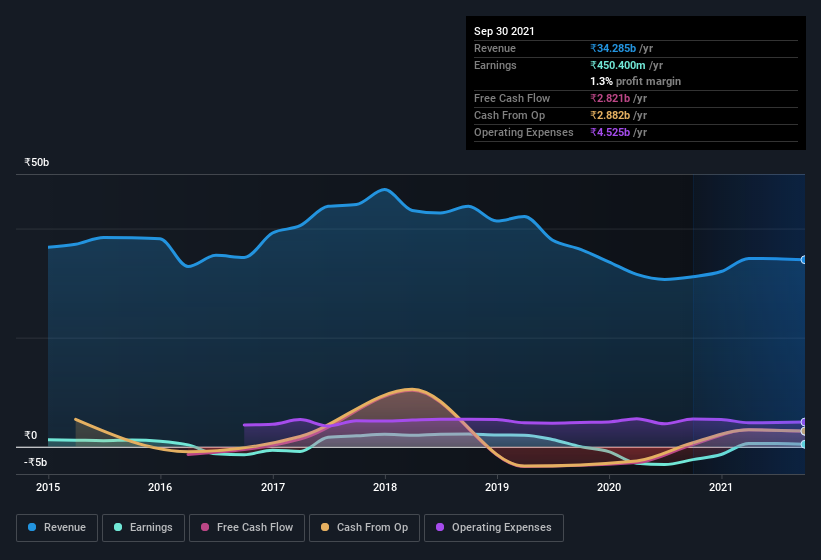- India
- /
- Electrical
- /
- NSEI:GVT&D
We Think GE T&D India's (NSE:GET&D) Profit Is Only A Baseline For What They Can Achieve
Even though GE T&D India Limited's (NSE:GET&D) recent earnings release was robust, the market didn't seem to notice. Investors are probably missing some underlying factors which are encouraging for the future of the company.
See our latest analysis for GE T&D India

Zooming In On GE T&D India's Earnings
As finance nerds would already know, the accrual ratio from cashflow is a key measure for assessing how well a company's free cash flow (FCF) matches its profit. In plain english, this ratio subtracts FCF from net profit, and divides that number by the company's average operating assets over that period. This ratio tells us how much of a company's profit is not backed by free cashflow.
As a result, a negative accrual ratio is a positive for the company, and a positive accrual ratio is a negative. That is not intended to imply we should worry about a positive accrual ratio, but it's worth noting where the accrual ratio is rather high. Notably, there is some academic evidence that suggests that a high accrual ratio is a bad sign for near-term profits, generally speaking.
For the year to September 2021, GE T&D India had an accrual ratio of -0.17. Therefore, its statutory earnings were very significantly less than its free cashflow. Indeed, in the last twelve months it reported free cash flow of ₹2.8b, well over the ₹450.4m it reported in profit. GE T&D India shareholders are no doubt pleased that free cash flow improved over the last twelve months.
Note: we always recommend investors check balance sheet strength. Click here to be taken to our balance sheet analysis of GE T&D India.
Our Take On GE T&D India's Profit Performance
Happily for shareholders, GE T&D India produced plenty of free cash flow to back up its statutory profit numbers. Because of this, we think GE T&D India's underlying earnings potential is as good as, or possibly even better, than the statutory profit makes it seem! And one can definitely find a positive in the fact that it made a profit this year, despite losing money last year. The goal of this article has been to assess how well we can rely on the statutory earnings to reflect the company's potential, but there is plenty more to consider. Just as investors must consider earnings, it is also important to take into account the strength of a company's balance sheet. If you're interested we have a graphic representation of GE T&D India's balance sheet.
This note has only looked at a single factor that sheds light on the nature of GE T&D India's profit. But there are plenty of other ways to inform your opinion of a company. For example, many people consider a high return on equity as an indication of favorable business economics, while others like to 'follow the money' and search out stocks that insiders are buying. While it might take a little research on your behalf, you may find this free collection of companies boasting high return on equity, or this list of stocks that insiders are buying to be useful.
New: Manage All Your Stock Portfolios in One Place
We've created the ultimate portfolio companion for stock investors, and it's free.
• Connect an unlimited number of Portfolios and see your total in one currency
• Be alerted to new Warning Signs or Risks via email or mobile
• Track the Fair Value of your stocks
This article by Simply Wall St is general in nature. We provide commentary based on historical data and analyst forecasts only using an unbiased methodology and our articles are not intended to be financial advice. It does not constitute a recommendation to buy or sell any stock, and does not take account of your objectives, or your financial situation. We aim to bring you long-term focused analysis driven by fundamental data. Note that our analysis may not factor in the latest price-sensitive company announcements or qualitative material. Simply Wall St has no position in any stocks mentioned.
Have feedback on this article? Concerned about the content? Get in touch with us directly. Alternatively, email editorial-team (at) simplywallst.com.
About NSEI:GVT&D
GE Vernova T&D India
Engages in building power transmission and distribution infrastructure in India and internationally.
Exceptional growth potential with outstanding track record.
Market Insights
Community Narratives



